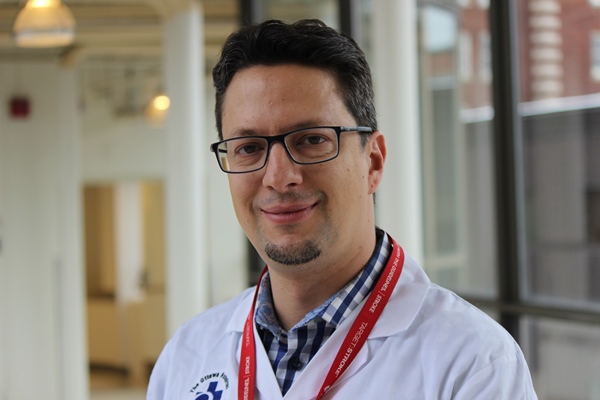 “This study will change the way we treat acute stroke,” said Dr. Dar Dowlatshahi. “With TNK, we can be faster, safer and more effective, thereby increasing the chance that our patients will recover their independence after stroke.”In the largest stroke clinical trial ever run in Canada, researchers have shown Tenecteplase (TNK), a safe, well tolerated drug, commonly used as a clot buster for heart attacks, is an effective treatment for acute ischemic stroke, a stroke caused by blood clots in the brain.
“This study will change the way we treat acute stroke,” said Dr. Dar Dowlatshahi. “With TNK, we can be faster, safer and more effective, thereby increasing the chance that our patients will recover their independence after stroke.”In the largest stroke clinical trial ever run in Canada, researchers have shown Tenecteplase (TNK), a safe, well tolerated drug, commonly used as a clot buster for heart attacks, is an effective treatment for acute ischemic stroke, a stroke caused by blood clots in the brain.
The results published in The Lancet show that TNK worked as well as, if not better than, the current recommended drug, Alteplase (tPA). TNK attaches itself to the clot in the brain for a longer period of time than tPA which means that blood flow is restored faster and for a longer period of time. It is also very easy to administer, making it a game-changer when seconds count to save brain cells.
Based on current guidelines, Alteplase (tPA) is the recommended drug for acute ischemic stroke patients. The challenge is that the drug is more complex to administer. It takes up to an hour and requires an infusion pump that needs to be monitored. The pump can be cumbersome when transporting a patient within a hospital, or to a major stroke center for treatment.
One of the reasons Tenecteplase is so effective is that it can be administered as a single immediate dose. This is a big advantage, saving critical time and complications. TNK could potentially be administered wherever the patient is seen first, at a medical centre or small hospital.
Along with discovering a better way to treat acute ischemic stroke, the team also established a more cost effective and efficient way to conduct clinical trials.
The trial was led by researchers with the University of Calgary at the Foothills Medical Centre and Sunnybrook Health Sciences Centre, fully affiliated with the University of Toronto. Drs. Dar Dowlatshahi and Michel Shamy of The Ottawa Hospital and the University of Ottawa sat on the trial’s steering committee and were the site leads at The Ottawa Hospital.
“This study will change the way we treat acute stroke,” said Dr. Dowlatshahi, neurologist and senior scientist at The Ottawa Hospital and professor at the University of Ottawa Brain and Mind Research Institute. “With TNK, we can be faster, safer and more effective, thereby increasing the chance that our patients will recover their independence after stroke.”
Of the 1,600 patients enrolled in the study, 49 came from The Ottawa Hospital.
The trial engaged patients and their families in study design and completed all enrolments during the pandemic when health systems were under significant stress.
The study involved 22 primary and comprehensive stroke centers across Canada and was supported by the Canadian Institutes of Health Research (CIHR), Alberta SPOR Support Unit - Strategy for Patient-Oriented Research (SPOR), Quality Improvement & Clinical Research Alberta Stroke Program.
See the media release from the University of Calgary for further details.
Local media contact:
Jenn Ganton
jganton@ohri.ca
613-614-5253
